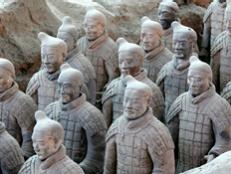Beijing: Know Before You Go

Hanquan Chen
With a society so steeped in tradition, it comes as no surprise that the Chinese have a strict set of etiquette guidelines for visitors to follow when passing through. While the rules were once much more intensely followed, there's still a level of respect one must exercise to avoid appearing rude. So take notes, lest you commit a cultural faux pas.
Respect the culture.
Just as you do when traveling in any unfamiliar territory, studying up on the history and traditions of a place will immediately help you build a rapport with the natives (and possibly help debunk the widespread myth that Americans are ignorant of other societies). Further bonus points if you can learn a few key phrases before your trip, such as Mandarin for "hello" (nihao), "goodbye" (zai jian) and "thank you" (xie xie).
Greet a new acquaintance appropriately.
When meeting someone for the first time, there is no need to bow, as was once the standard. A firm handshake and polite nod are satisfactory. However, if a new acquaintance hands you a business card, receive it with both hands, read it over meticulously, and safely tuck it in your wallet or bag for safe keeping, taking great care to not damage it in the process.
Come bearing gifts.
As the old Chinese proverb goes, "courtesy demands reciprocity," meaning when you meet someone for the first time, you should bring presents. The ideal packaging for any gift is red, and whatever you do, avoid wrapping in white and black, which are viewed as ominous. Don't fret over what to bring: A small token from your country is ideal, but cigarettes are always well-received (and easier on your bank account).

Bargain ... but nicely.
You'll almost never visit an Asian country where bargaining at markets isn't accepted. The owner of the store or stall may act offended — he really isn't. It's simply a way to get you to back down. Bargaining is the norm. Just remember to do it as if you were dealing with your elders: with a hearty dose of respect. Keep your voice calm and level, and whatever happens, don't get mad or lose your temper. If you aren't seeing eye to eye, simply walk away. It's always safe to begin at a quarter of the "retail price" and find a meeting ground from there.
Clean your plate.
One should always eat everything that is put in front of him; otherwise, it upsets the cook. While you don't necessarily have to consume every last crumb, do try a little of everything served to you and leave as little left over as possible. The same goes with drinking: It's rude not to partake. If a dinner companion lifts his glass, you follow suit. Cheers!
Never leave your chopsticks sticking upright in your rice bowl. In China, it symbolizes that someone has died and is a way to honor the deceased.
Mind your sticks.
There are a few rules of thumb for chopsticks. Never leave your chopsticks sticking upright in your rice bowl. In China, it symbolizes that someone has died and is a way to honor the deceased. A safe resting place is together on your plate or lying across the top of the bowl. Other things to avoid doing with your utensils: licking them, pointing with them at others, and stabbing your food (or your tablemate's).
Tip only if the service is great.
Unlike in the United States, tipping isn't customary in China. However, if the food is good and service is even better — and particularly if you want to return to the establishment in the near future — don't be afraid to leave behind a few extra bucks (anywhere between 5% and 15% of the price of your meal). Unlike in some countries where tipping isn't a rule of thumb, the Chinese won't be offended that you recognize their efforts; quite to the contrary, you'll establish a favorable relationship.
Conceal your cash.
Don't go doling out bills by shoving a wad of cash into someone's outstretched hand. In China, such actions are considered disrespectful. Money should always be placed in a red envelope — red denotes good luck in China and is said to ward off evil spirits — if the occasion is a happy one, such as a wedding or a holiday, and it should equal an even number, which is also considered lucky. For the purpose of condolences, such as helping out with funeral costs, leave the money in a white envelope and be sure the sum ends in an odd number.







































